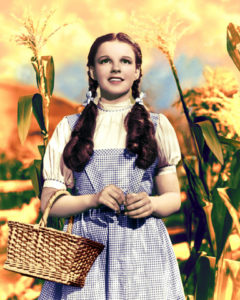 At the 2014 Oscars, they celebrated the 75th anniversary of the release of the “Wizard of Oz” by having Pink sing “Somewhere Over the Rainbow”, with highlights from the film in the background. But what few people realized, while listening to that incredible performer singing that unforgettable song, is that the music is deeply embedded in the Jewish experience.
At the 2014 Oscars, they celebrated the 75th anniversary of the release of the “Wizard of Oz” by having Pink sing “Somewhere Over the Rainbow”, with highlights from the film in the background. But what few people realized, while listening to that incredible performer singing that unforgettable song, is that the music is deeply embedded in the Jewish experience.
The film came out on January 1, 1939. This was less than two months after the notorious Kristallnacht – night of the crystal – when Jewish businesses were looted, synagogues attacked and Jewish storefronts had their windows smashed by the Nazi regime in Germany. WWII was exactly 8 months away. In other words, the Holocaust was about to begin. Six million Jews would be murdered, one million of them children, for no other reason other than that they were Jews.
In the prelude to this orgy of murder, three great revolutionary movements were incubated in the Jewish towns and villages of Germany and eastern Europe: Communism, Zionism and Americanism. The Communists tried to avert the impending destruction of European Jewry by doing away with all nationalism and creating a utopian Communist society where Jews would not be persecuted because no one would be persecuted. There would be no nations and no religions. Kind of John Lennon’s utopian “Imagine”. The Zionists attempted to overcome Jewish powerlessness by empowering Jews. Nations would not disappear right away, they said. Rather, the only way to avert the destruction of world Jewry was for Jews to go back to their ancient homeland and establish themselves as a people. Only that way, when the great melding of humanity would happen, Jews could join the community of nations. For their part, those Jews that emigrated to America – especially in the great waves at the end of the 19th century and the beginning of the 20th century – believed that the solution to the “Jewish question” had already been invented – America!
Whereas Communists wanted to assimilate in the lands that they lived in, and Zionists wanted to assimilate on a national level i.e., let’s create Israel so we can be a “nation like any other nation”, for millions of imperiled Jews assimilation was possible only in America. In America, they argued, everyone assimilates. Of course, many came to America to physically survive. They had no desire to give up their identity. But many others saw America not as a land of refuge or opportunity but as a dreamland that exists “somewhere over the rainbow.” In that land, they thought, “skies are blue and the dreams that you dare to dream really do come true”.
When the clouds of anti-Semitism were gathering over Europe – as they are once again gathering now – out of the collective Jewish angst that the immigrants brought to America, a handful of Jews translated their assimilationist fantasies onto a new medium – film. As Neal Gabler has so remarkably documented in “An Empire of Their Own: How the Jews Invented Hollywood” all the Hollywood studios were created by Jewish immigrants. Columbia Pictures was founded by Adolph Zukor from Hungary, Universal was founded by Carl Laemmle from Germany, MGM by Louis B. Mayer from Belarus, Warner Brothers by Polish immigrants Harry, Albert, Sam and Jack Warner (Jack was the only brother born in North America). The list goes on. The genius of these “moguls” was that they were able to translate shtetl dreams into American feature films. Suddenly, their fantasies of white picket fences, strong fathers, loving neighbours and a society where race and religion didn’t matter became everyone’s fantasies. “Americanism” morphed into “Hollywoodism”, and Hollywoodism replaced the real America with the America of the films. For example, the American army was segregated up to and including WWII. But in Hollywood films, the American army was integrated and that’s how we remember the Second World War – blacks and whites fighting together in platoons that never existed. Similarly with the Westerns. Bad guys with high boots terrorizing religious townspeople until a new sheriff rode into town didn’t actually happen in the American West. But the Hollywood Jews managed to take the experience of eastern European Jews terrorized during pogroms by Ukrainian Cossacks and convert it into the classic American Western.
The fantasies of immigrant Jews wanting to be “real” Americans were popularized not only by Hollywood producers – there were also the Broadway and Tin Pan Alley Jews. It is no accident, for example, that the greatest Christmas songs of all time were written by Jews. For example, “Rudolph, the Red-Nosed Reindeer” was written by Johnny Marks and “White Christmas” was penned by a Jewish liturgical singer’s (cantor) son, Irving Berlin. But perhaps the most poignant song emerging out of the mass exodus from Europe was “Somewhere Over the Rainbow”. The lyrics were written by Yip Harburg.  He was the youngest of four children born to Russian Jewish immigrants. His real name was Isidore Hochberg and he grew up in a Yiddish speaking, Orthodox Jewish home in New York. The music was written by Harold Arlen, a cantor’s son. His real name was Hyman Arluck and his parents were from Lithuania. Together, Hochberg and Arluck wrote “Somewhere Over the Rainbow”, which was voted the 20th century’s number one song by the Recording Industry Association of America (RIAA) and the National Endowment for the Arts (NEA). In writing it, the two men reached deep into their immigrant Jewish consciousness – framed by the pogroms of the past and the Holocaust about to happen – and wrote an unforgettable melody set to near prophetic words. Read the lyrics in their Jewish context and suddenly the words are no longer about wizards and Oz, but about Jewish survival:
He was the youngest of four children born to Russian Jewish immigrants. His real name was Isidore Hochberg and he grew up in a Yiddish speaking, Orthodox Jewish home in New York. The music was written by Harold Arlen, a cantor’s son. His real name was Hyman Arluck and his parents were from Lithuania. Together, Hochberg and Arluck wrote “Somewhere Over the Rainbow”, which was voted the 20th century’s number one song by the Recording Industry Association of America (RIAA) and the National Endowment for the Arts (NEA). In writing it, the two men reached deep into their immigrant Jewish consciousness – framed by the pogroms of the past and the Holocaust about to happen – and wrote an unforgettable melody set to near prophetic words. Read the lyrics in their Jewish context and suddenly the words are no longer about wizards and Oz, but about Jewish survival:
 He was the youngest of four children born to Russian Jewish immigrants. His real name was Isidore Hochberg and he grew up in a Yiddish speaking, Orthodox Jewish home in New York. The music was written by Harold Arlen, a cantor’s son. His real name was Hyman Arluck and his parents were from Lithuania. Together, Hochberg and Arluck wrote “Somewhere Over the Rainbow”, which was voted the 20th century’s number one song by the Recording Industry Association of America (RIAA) and the National Endowment for the Arts (NEA). In writing it, the two men reached deep into their immigrant Jewish consciousness – framed by the pogroms of the past and the Holocaust about to happen – and wrote an unforgettable melody set to near prophetic words. Read the lyrics in their Jewish context and suddenly the words are no longer about wizards and Oz, but about Jewish survival:
He was the youngest of four children born to Russian Jewish immigrants. His real name was Isidore Hochberg and he grew up in a Yiddish speaking, Orthodox Jewish home in New York. The music was written by Harold Arlen, a cantor’s son. His real name was Hyman Arluck and his parents were from Lithuania. Together, Hochberg and Arluck wrote “Somewhere Over the Rainbow”, which was voted the 20th century’s number one song by the Recording Industry Association of America (RIAA) and the National Endowment for the Arts (NEA). In writing it, the two men reached deep into their immigrant Jewish consciousness – framed by the pogroms of the past and the Holocaust about to happen – and wrote an unforgettable melody set to near prophetic words. Read the lyrics in their Jewish context and suddenly the words are no longer about wizards and Oz, but about Jewish survival:
Somewhere over the rainbow
Way up high,
There’s a land that I heard of
Once in a lullaby.
Way up high,
There’s a land that I heard of
Once in a lullaby.
Somewhere over the rainbow
Skies are blue,
And the dreams that you dare to dream
Really do come true.
Skies are blue,
And the dreams that you dare to dream
Really do come true.
Someday I’ll wish upon a star
And wake up where the clouds are far
Behind me.
Where troubles melt like lemon drops
Away above the chimney tops
That’s where you’ll find me.
And wake up where the clouds are far
Behind me.
Where troubles melt like lemon drops
Away above the chimney tops
That’s where you’ll find me.
Somewhere over the rainbow
Bluebirds fly.
Birds fly over the rainbow.
Why then, oh why can’t I?
Bluebirds fly.
Birds fly over the rainbow.
Why then, oh why can’t I?
If happy little bluebirds fly
Beyond the rainbow
Why, oh why can’t I?
Beyond the rainbow
Why, oh why can’t I?
The Jews of Europe could not fly. They could not escape beyond the rainbow. Harburg was almost prescient when he talked about wanting to fly like a bluebird away from the “chimney tops”. In the post-Auschwitz era, chimney tops have taken on a whole different meaning than the one they had at the beginning of 1939.
Pink’s mom is Judith Kugel. She’s Jewish of Lithuanian background. As Pink was belting the Harburg/Arlen song from the stage at the Academy Awards, I wasn’t thinking about the movie. I was thinking about Europe’s lost Jews and the immigrants to America. I was then struck by the irony that for two thousand years the land that the Jews heard of “once in a lullaby” was not America, but Israel. The remarkable thing would be that less than ten years after “Somewhere Over the Rainbow” was first published, the exile was over and the State of Israel was reborn. Perhaps the “dreams that you dare to dream really do come true”.
http://www.dailymotion.com/video/x1ebamm_hd-p-nk-somewhere-over-the-rainbow-oscars-2014_music
Read more: Pink, the Oscars and the..

Комментариев нет:
Отправить комментарий